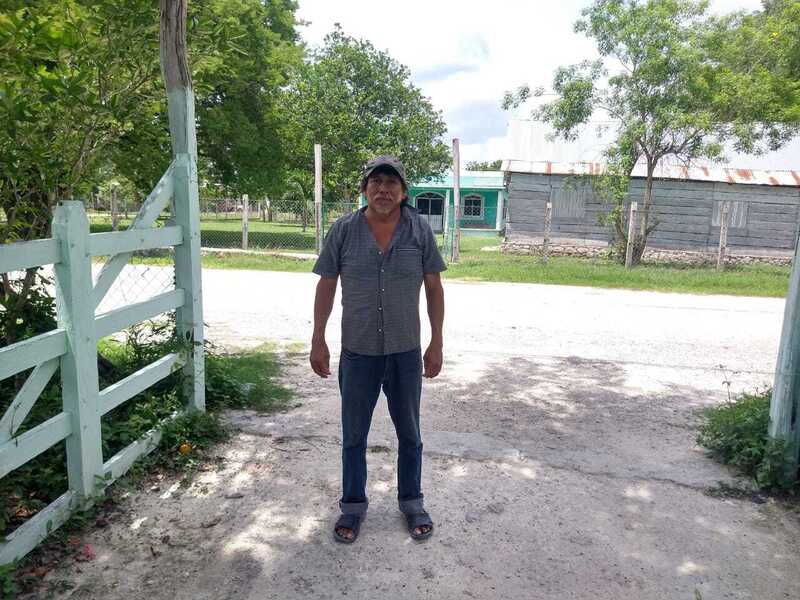Beekeeping chronicles: how to take care of a jungle producing honey



More than 30 years of beekeeping have taught Don Alejandro Oliveros López the intrinsic relationship between bees and the jungle. Also, between bees and humans; between bees and fruits; between bees and animals; between bees and medicine; and between bees and water. 'Beekeeping gets along very well with forest conservation, is a noble activity, with a good harvest, it gives a good resource, it allows us to survive. Every activity has a form of danger, but a bee stings you and nothing happens, oh, how it hurts! ' he laughs. 'I started beekeeping with my family, many laughed at us because they said we were lazy, that we didn't turn our backs on the sun. But then everyone started to be lazy! Now fortunately we harvest more than 200 tons of honey in the ejido. What if I started liking it? Well, look, all things are born out of necessity, not really out of taste. Here we lack water, transportation, health. I didn't like it before, but it left me to live. Now it's the way of life I choose. '
Don Alejandro was taught by his uncle, who previously only produced wax because honey was very poorly paid 30 years ago and the medicinal and nutritional benefits that we know today were rarely recognized. Don Alejandro, however, bet on honey. 'We started by putting our hives made with our own wood, the equipment was really expensive back then, so we did it; the first year we made 12 hives (in the mid-90s). We started to do well, we understood how to do it and we had very productive years. We began to invite more colleagues from the community, at first not everyone wanted to enter it, but today it is a job that is in our blood. '
A world without bees is a big catastrophe, I think everything would end. If there are no bees there is no jungle either, and then, if there is no jungle, goodbye climate and goodbye water.
Don Alejandro belongs to the Conhuás ejido, located in Campeche, one of the states with the highest honey production and where beekeeping is strongly rooted in family practices, which sometimes touch back millennia. With this ejido we developed a nature conservation and forest carbon sequestration project, because with more than 50,000 hectares of jungle and adjacent to the Calakmul Biosphere Reserve, the urgency to protect the great biocultural heritage that the Conhuás community possesses was imperative. Hearing Don Alejandro's voice say that 'now, being our protected ejido, we cannot cut down trees and that is very productive for bees' makes us realize that the project we jointly developed goes beyond the carbon that is sequestered year after year, and is rather an ode to the dedication and commitment with which ejidatarios actively decide to protect their natural resources and dedicate themselves to productive activities that coexist with the jungle and its biodiversity.
'The main pollinators of fruits are bees. Here in Conhuás we are blessed because there are no large areas of cornfields or pastures where insecticides are placed; since this is Reserva, The jungle takes care of itself. All the chicozapote, the guaya, all the monkeys' and chachalacas food is pollinated by bees. There are parts of the jungle that bees don't like, usually where there's no water they're not there; we'll never find them far from bodies of water. Even animals go after bees because they know that where there are bees, there is water! ' Don Alejandro's understanding of ecosystem dynamics is enormous, as is his recognition of the factors that affect the well-being of his bees. The honey that he and his family produce, like the vast majority of the community, is organic, because apart from a seal that proves it, his bees feed on flowers that have not been treated with pesticides, since the extensive jungle they cover is protected. 'My favorite honey is the one that takes care of bees, we don't use vitamins or anything that isn't natural, it comes from the flower of the Xuul tree (Lonchocarpus guatemalensis) and With that honey we don't need anything else for our bees to be strong; it's the best medicine, it's something beautiful, because the jungle itself takes care of them. '
In Mexico, the biggest threats to beekeeping are the use of pesticides, habitat loss, the lack of floral diversity, climate change and the lack of awareness. Don Alejandro and the Conhuás community face all these situations. On the one hand, by conserving their jungle, they conserve the enormous biodiversity they protect, which allows them to have high quality honey, flavor and smell: 'our honey is multifloral. Since we live in a reserve we have very different species of trees. Even so, there are times when bees prefer chacá, jabín or pucté, and we know this because honeys taste very different and smell different too. We are reproducing our hives, we have tried to buy certified queens but the truth is that they do not prosper. A lot of predators live in this jungle, so certified queens who aren't used to so much biodiversity can't survive. That's how we decided to play our own queens. '
On the other hand, as beekeeping and forest conservation are intrinsically linked, so are the increase in carbon sinks that sequester atmospheric carbon dioxide and tackling the climate crisis. Don Alejandro says it in his own words: 'A world without bees is a big catastrophe, I think everything would end. If there are no bees there is no jungle either, and then, if there is no jungle, goodbye climate and goodbye water. '
Finally, his enormous experience, knowledge and work inspire the collective awareness that we need to solve the problem that puts beekeeping, and therefore, the jungles at risk: 'my nephew, who today is the ejidal president, when he was a boy he always watched us go to the jungle to get hives, until one day he told me that he wants to come with me and see how it's done. We went by bike in the early morning, there through the big hills; we arrived and lit the fire, we started smoking. It was a good day, he helped me get out a 20-liter bucket and even the boy wanted to go for more! Since it was still dark, I was afraid of meeting a jaguar so I told him we'd better go back, and on the way out we found some soldiers who craved honey. At that time the liter cost 3 pesos more or less and they tell us -'I buy them everything they bring for 200 pesos' and well for the time that was a lot of money so I gave them everything. My nephew, instead of being happy, just looked sad because what he wanted was to get to eat bread with honey! ' He told us about the longing of someone who revisits a happy memory. 'That boy, now an adult, to this day he is a beekeeper. He was amazed and the truth is that he is a great producer. As the grandparents used to say, -'Life gives you the sack, you'll know what you're doing with it' and well, in the midst of so much stuff, I decided to make honey'.

Alejandro Oliveros López
Acknowledgements
To Alejandro Oliveros López for telling us about his experience; to Octavio Santiago, brigade leader from the southeast in Toroto, for facilitating this beautiful dialogue.
About the author
Sandra is Executive Editor in Toroto. She studied biology, is passionate about the different forms of life that exist on the planet and is fully committed to protecting and conserving them.
Explore reflections, research and field learning from our work in ecosystem restoration.